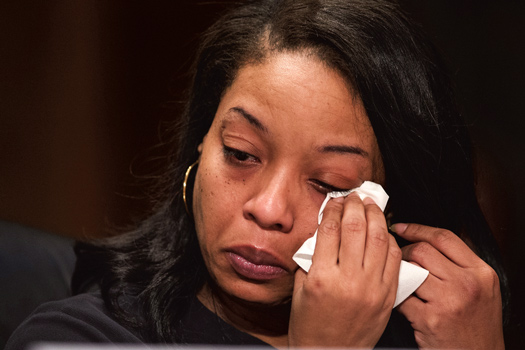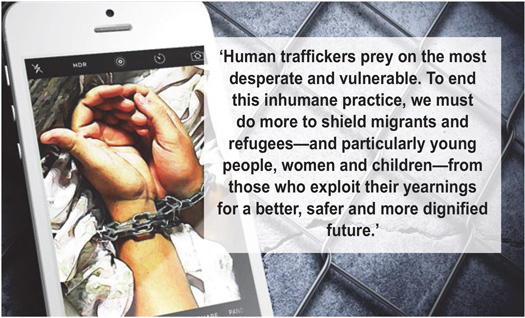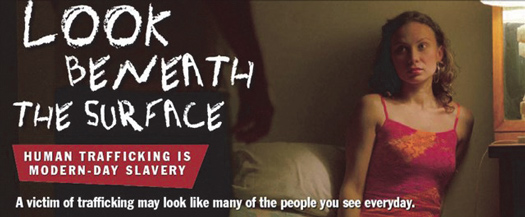Worldwide shame and abuses inside the U.S.
By Barrington M. Salmon -Contributing Writer- | Last updated: Jan 17, 2017 - 6:18:34 PMWhat's your opinion on this article?

Kubiiki P. wipes tears from her eyes as she testifies about her daughter becoming sex trafficked during the Senate Homeland Security and Governmental Affairs Permanent subcommittee hearing into Backpage.com knowing facilitation of online sex trafficking, Jan. 10 on Capitol Hill in Washington. Photo: AP Wide World Photos
|
Human trafficking means suffering, slavery, prostitution and death and the problem is closer to you than you might think
WASHINGTON—Although human trafficking generally operates out of the eyesight or awareness of ordinary Americans, its tentacles reach into every community and neighborhood snatching away men, women and children who become slaves to the people who control them.
January is Human Trafficking Awareness Month and survivors, supporters and advocates made their voice heard on Jan 11, designated as National Human Trafficking Awareness Day 2016.
According to officials of Zoe, human trafficking is a $32 billion a year industry with 20 million people enslaved around the world which is double the population of New York. Twenty-six percent are children, a quarter of whom are younger than 18. Zoe is an organization working to stamp out human trafficking and through its intervention program. It works with law enforcement and government agencies in raids, prosecutions, and the rescue of trafficking victims.
United Nations officials say every country in the world is affected by human trafficking, whether as a country of origin, transit or destination for victims. The link between the refugee and migration crisis and trafficking in persons was highlighted at the 2016 observance of the World Day against Trafficking of Persons by the UN Office for Drugs and Crime.
Former Secretary-General Ban Ki-moon denounced the practice in remarks during the observance.
“Human traffickers prey on the most desperate and vulnerable,” he said. “To end this inhumane practice, we must do more to shield migrants and refugees—and particularly young people, women and children—from those who exploit their yearnings for a better, safer and more dignified future.”
Meanwhile, every year, human rights activists and advocates explain, thousands of men, women and children fall into the hands of criminals associated with human trafficking and are coerced, beaten and brutalized for forced labor or sexual exploitation. And every year, these human and victims’ rights advocates say, the problem is getting worse.
Thousands of individuals and organizations are involved in combatting and working for the elimination of human trafficking. One activist is Chioma Adaku, founder and executive director of Traffik Stops, a faith-based, global coalition that raises awareness about human trafficking through advocacy, education, and empowerment.

|
Since 2002, Mrs. Adaku said she’s been involved in her own personal battle against human trafficking and with Traffik Stops she formalized her work. Traffik Stops, based in Hampton, Va., was created in 2016, she said, with the support of religious organizations who share her concerns about the corrosive effects of human trafficking on victims and survivors.
“I am a parent and this created a disturbance in me,” Mrs. Adaku told The Final Call during a recent interview. “Three years ago, I was in Naples, Italy with my husband. I wanted an African sister to make some clothes and I met victims of human trafficking. I ran into a couple of African brothers who worked for a guy for five years and had never been paid because he provided them a place to live.”
“Then I went to Casa Ruth Safe House which is run by Catholic nuns. There were 25 women there, all human trafficking victims. I tried but I couldn’t get them out of the life. I couldn’t get them out of the life. They came to Italy because they wanted to be models but when they got there, they were assigned to pimps who took their passports and identification.”
When she returned to the United States, Mrs. Adaku, who recently served as chief of staff for Congressional candidate Shawn Brown, said she turned her attention to human trafficking in this country after seeing the signs of it all around her.
“In the U.S., there are upwards of 900,000 who are missing and many of them are pulled into human trafficking,” she said. “Virginia is No.1 in the nation for child sex trafficking and No. 6 for human trafficking. In 2016, 392 cases of human trafficking were reported in Virginia. Other states like Texas and California rank highly as well.”
Virginia Attorney General Mark Herring captured the extent of the problem and vows to fight it.
“Human trafficking is an emerging public safety threat across our nation, including here in Virginia,” he said in a statement. “Trafficked victims don’t come from any one place. They come from large cities, small towns, different socioeconomic situations and diverse ethnic and racial backgrounds. As Attorney General, combating human trafficking will be a priority in my office and I will work with the General Assembly, law enforcement and prosecutors to eradicate it in Virginia.”
Virginia’s Office of the Attorney General has supported legislation imposing increased penalties for traffickers. In 2011, the office partnered with the Department of Criminal Justice Services to train prosecutors, law enforcement, and victim-witness coordinators from jurisdictions across Virginia in how to investigate and prosecute human trafficking under Virginia law.
Victims are not commonly kidnapped as seen in the movie Taken, Mrs. Adaku said, but are manipulated by the friendship of those in their age group, are runways due to sex abuse, are moved through some mission groups or non-governmental organizations, exploited by family, peers, international third-party recruiters, employers, organized crime groups and organizations, recruited from strip clubs, massage parlors, intimate partners, neighbors, sex buyers, or they are kidnapped.
Significant numbers of those affected by human trafficking are people of color—Blacks, Asians and Latinos, Mrs. Adaku said.
“What is not commonly acknowledged is 85 percent are people of color. We need to unambiguously identify the connections between trafficking, poverty, immigration, gender, and racism to effectively end human trafficking in the U.S.,” she argued. “The Bureau of Justice Statistics reports statistics but 747 out of 1,442 reported incidents recorded no racial or ethnic origin.”
“Also, when people think of human trafficking they think of prostitution but people are stolen and their organs are harvested—a problem which is huge in Haiti—and some become victims of satanic rings,” she said.
Mrs. Adaku—who said she was victim of molestation as a child and raped by her first husband—indicated that it is commonplace for boys and girls to be brought into the sex life as young as age six.

|
“I did some direct care for a client, a 27-year-old woman who was introduced to the lifestyle at six through child sex, but also had to endure molestation. She came from a family of prostitution that included her mother and sisters. Her husband is her pimp and they travel to D.C., Virginia and elsewhere. They have Craigslist and other online places where traffickers post pictures. Kids are placed in cages, pushed into sex slavery and forced labor. It’s really overwhelming. Human trafficking is the No. 1 crime and it’s a combination of drugs, weapons and human trafficking.”
Mrs. Adaku said most people think human trafficking is driven by perversion, but at the end of the day, victims are a commodity and traffickers are able to buy and sell their victims for economic gain.
“There are no other economic development opportunities where you can buy and sell the same product or service over and over without paying taxes, work with no or low payment or on terms which are highly exploitative to a $152 billion industry when the benefits outweigh the harm and cost,” she said.
According to statistics from Polaris, sex trafficking is an epidemic in the United States and has increased, 26 percent are children, and 55 percent are women and girls. Polaris is considered a leader in the global fight to eradicate modern slavery. Named after the North Star that guided slaves to freedom in the U.S., Polaris seeks to systemically disrupt human trafficking networks. The organization’s comprehensive model puts victims at the center of what they do—helping survivors restore their freedom, preventing more victims, and leveraging data and technology to pursue traffickers wherever they operate.
LaTaunya Beverly, an Emergency Response Aide with Traffik Stop and a friend and associate of Mrs. Adaku, spoke of the satisfaction and dangers associated with their work.
“I’ve been an advocate all my life but never in a formal situation. I took girls off streets, helped them, provided a place for them to stay,” she said. “I met Chioma and the work we each were doing crossed. We thought about being emergency response aides as a way to help transition young women. I assist Chioma. Whenever she says ‘I need help,’ I’m there. We do it ourselves. We learned what was needed. We had a young lady who escaped her human trafficker and we went through a continuous process with her, trying to keep her safe, help her get away. Her trafficker was following her. We stayed two steps ahead of her. I have a pistol and my family members train me.”
“It’s very dangerous because this is an industry. You have politicians and a host of other officials involved. Major people are involved. You could get killed because you’re digging into their pockets. We’re ready though. It’s nothing but bringing awareness. We’re ready.”
Meanwhile, the challenges on multiple fronts continue for advocates and activists.
Crimes of human trafficking are typically difficult to research, incidents are under-reported or not reported at all and difficult to identify, advocates assert. Then there is the involvement and complicity of legitimate businesses. For example, the National Trafficking Resource Center through its research is dispelling many common misconceptions about sex and labor trafficking, including the fact that many visible and legal businesses, such as restaurants, hotels and manufacturing plants, may be exploiting the labor of human trafficking victims.
Nisha Varia, a senior researcher for Human Rights Watch, lamented in a blog post that “sadly, victims of forced labor are too often treated like criminals instead of people who are entitled to assistance.” And Denise Brennan, author of the book “Life Interrupted: Trafficking into Forced Labor in the United States,” identifies immigration law as another barrier for trafficking victims, telling Rolling Stone magazine that “our current immigration regime—deportation regime—makes it impossible to fight trafficking.”
Mrs. Adaku is strengthening Traffik Stops locally, nationally and internationally.
She said grassroots groups fighting against acts of violent crime have been divided by the devolution of programs in states from across the country. These organizations are working on similar issues but have no way of knowing that they have allies or how to communicate with one another about their work.
“Devolution of the political system made organizing exceptionally difficult, as grassroots groups were isolated from each other, as well as the larger global coalitions’ debates,” said Mrs. Adaku. “Our goal thereby has become developing the organizing power to change policy so that it is fair to those being affected by modern-day slavery. We do this by building a strong coalition of more than 40 grassroots groups, currently in 20 U.S. states and three countries to share information and strategies for effecting political change within their communities.”
Other goals are to organize coalitional networks that cross constituency lines to include domestic violence, bullying, and all individuals involved and affected by human trafficking. And seeking, through each campaign, to involve new organizations, religious groups, and activists to build numbers, capacity and power as the organization moves forward, she said.
INSIDE STORIES AND REVIEWS
-
-
About Harriett ... and the Negro Hollywood Road Show
By Rabiah Muhammad, Guest Columnist » Full Story -
Skepticism greets Jay-Z, NFL talk of inspiring change
By Bryan 18X Crawford and Richard B. Muhammad The Final Call Newspaper @TheFinalCall » Full Story -
The painful problem of Black girls and suicide
By Charlene Muhammad -National Correspondent- » Full Story -
Exploitation of Innocence - Report: Perceptions, policies hurting Black girls
By Charlene Muhammad -National Correspondent- » Full Story -
Big Ballin: Big ideas fuel a father’s Big Baller Brand and brash business sense
By Bryan Crawford -Contributing Writer- » Full Story






 Click Here Stay Connected!
Click Here Stay Connected!








